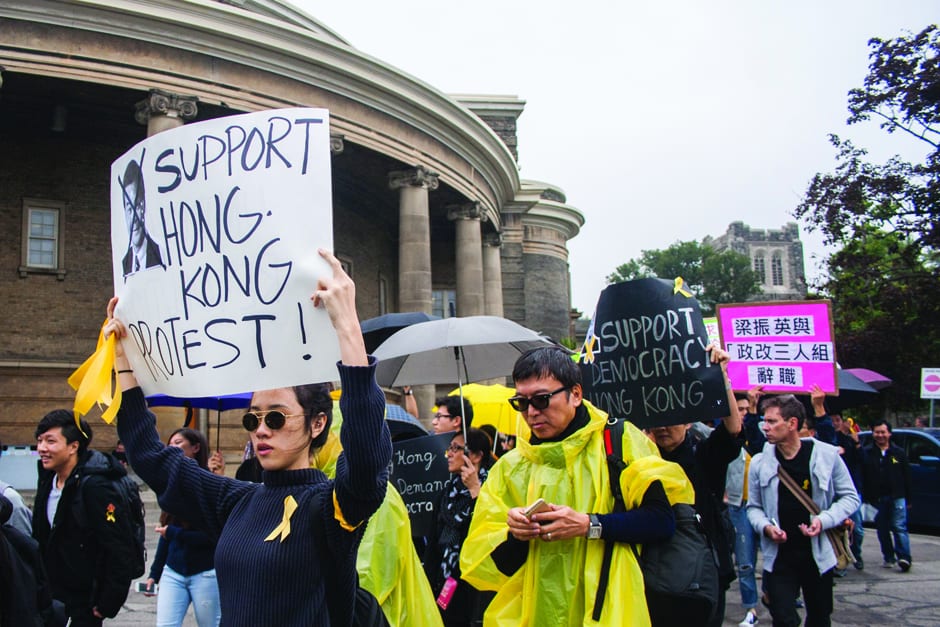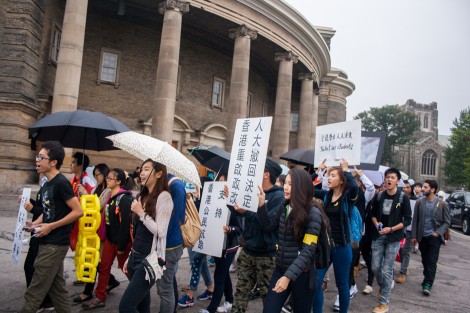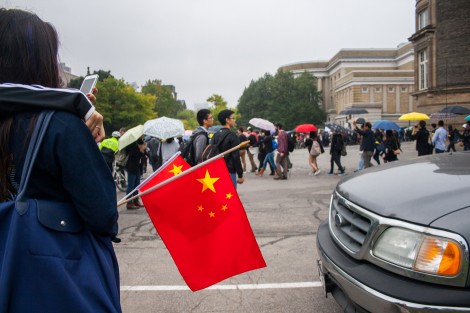Students armed themselves with umbrellas as rain threatened when they gathered in King’s College Circle on October 1 to support ongoing protests in Hong Kong.
The protests, known as the “Umbrella Revolution” or the “Umbrella Movement,” call for universal suffrage in Hong Kong.
Currently, Hong Kong’s Chief Executive is elected by a committee of 1,200 members in accordance with Article 45 of the Hong Kong Basic Law, a constitutional law that went into effect following the handover of Hong Kong by the UK. The same article allows for “gradual and orderly” change in the specific method for selecting the Chief Executive.
“The ultimate aim is the selection of the Chief Executive by universal suffrage upon nomination by a broadly representative nominating committee in accordance with democratic procedures,” the article reads.
The student march was one of several marches province-wide organised by the Ontario United Front for Hong Kong Students (OUFHKS). The group was quickly set up by a group of Hong Kong students at postsecondary institutions across Ontario.
Similar protests and demonstrations were held in over 70 cities worldwide, including nearly 20 cities in Canada.
“Fighting for true democracy in Hong Kong”
Sharon Chung, a second-year GIS and computer science student and founding member of the OUFHKS, said organizers skipped classes and endured sleepless nights to organize the protests. “We are fighting for true democracy in Hong Kong,” Chung said.
“We really hope we can help people in Hong Kong to raise awareness to people in Canada [and] internationally,” added student Lee-Ki Sin, a fourth-year cognitive science student and OUFHKS executive.
The protesters gathered at King’s College Circle and walked up St. George Street to the Hong Kong Economic and Trade Office (HKETO) a couple blocks north of Bloor Street West, where a petition was left on the steps of the front door. The HKETO was closed in observance of the Chinese National holiday, the sixty-fifth anniversary of the founding of the People’s Republic of China.
An estimated 1,000 people participated in the protests, including students, union representatives, and Toronto residents.
Sin was surprised by the turnout. “We weren’t expecting that many people,” she said, adding: “Every participant was really calm and respect[ed] everyone’s views.”
Jason Ngan, a second-year student at UTSC, said he joined the protest to support the democratic rights of Hong Kong citizens. “The main objective is universal suffrage for Hong Kong people,” said Ngan.
According to a decision by the Chinese government on August 31, the 2017 Chief Executive Elections “may be implemented by the method of universal suffrage,” however, the candidates will be selected by majority by a nominating committee that has the same structure as the current Election Committee.
Hong Kong pro-democracy advocates felt betrayed by the decision, fearing that the nomination committee would be little more than a filter for the Beijing government. Scholarism, a Hong Kong student activist group formed in May 2011, organized the protests, demanding that candidates be chosen through civil nomination. Other political groups have since joined the protests, calling for civil nomination and the resignation of Chief Executive C. Y. Leung.
There is also anxiety amongst students from Hong Kong as friends and family back home join the protests. “Most of us are stuck [in Canada],” said Nicholas Yip, a second-year mechanical engineering student.
Chinese National Day
The University of Toronto has approximately 6,000 students from mainland China and approximately 300 from Hong Kong.
At the same time as the protests, a group of Chinese students celebrated Chinese National Day in King’s College. The students stood around in a circle and sang national songs as people gathered to join the protests. They later dispersed peacefully just before the protest moved on. The organizer of the Chinese National Day celebration declined to be identified.
Fang*, a student from mainland China, said mainland Chinese students feel hurt at the perceived rejection of shared national identity. “They think they don’t belong with us,” said Fang.
“Hong Kong is a beautiful girl. She used to be in a relationship with Britain. However, Hong Kong was arranged to marry China and Britain gave her up. Hong Kong does not feel that China is [her] true love,” said Chengyuan Ma, a second-year political science student from mainland China.
Chung said that organizers with the OUFHKS were aware of opposing values. “We are focusing on Hong Kong democracy and our friends (back home).”
Ben Kong, a second-year political science student and president of the University of Toronto Chinese Politics Society (UTCPS), said he does not believe Hong Kong’s identity to be separate from his national Chinese identity. “Hong Kong has its own distinct culture like other [provinces] in China. Our distinct culture doesn’t separate us from our Chinese identity,” Kong said.
“[T]he Chinese element in the Hong Kong identity cannot be separated,” he added.
*First name omly used at student’s request.




